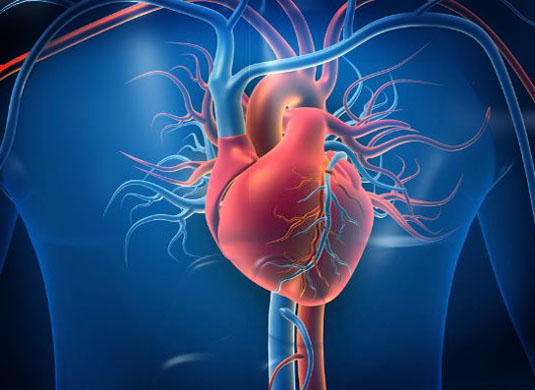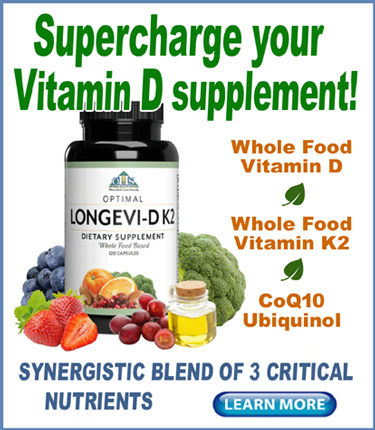In recent years the health benefits of both vitamins K2 and D have received a lot of attention in institutional research and media coverage. Most of the attention has focused on energy, bone, muscle and immune health—though the health benefits appear to be endless.
However, what most consumers don’t realize is that the benefits provided by the two nutrients appear to be amplified when the vitamins are supplemented synergistically.
This synergy was demonstrated recently in a study from Denmark that found taking a combo supplement with the two nutriets lowered the risk of coronary artery calcification in people at high risk.
Coronary artery calcification is a buildup of calcium in the heart’s two main arteries—also called “coronary arteries.”
The calcium buildup happens after a person has had plaque (fat and cholesterol) forming in their arteries (atherosclerosis) for about five years; hence, coronary artery calcification is highly prevalent in patients with coronary heart disease.
Though the findings of the present study are recently-published, the findings are part of the Aortic Valve Decalcification Trial which actually commenced in January 2018.
Study details
To conduct the study—a randomized, placebo-controlled trial—researchers tracked 304 men with higher coronary artery calcification scores. The trial was conducted at four Danish hospitals located at Odense, Svendborg, Vejle, and Silkeborg.
To be included in the trial study subjects were required to have no previous heart valve surgery, moderate aortic stenosis, or treatment with Vitamin K agonists. The study also excluded participants with previous myocardial infarction or coronary artery bypass graft surgery.
Did you know?
There are two types of Vitamin K
“Vitamin K” is actually a class of vitamins. This class includes Vitamin K1 (also called phylloquinone), as well as Vitamin K2 (menaquinone). They work differently in the human body and come from different food sources.
Vitamin K1 comes from plant sources such as leafy greens and blueberries. Vitamin K2 is more common in animal products, fermented foods and some kinds of cheese.
Vitamin K2 remains in the body longer than Vitamin K1 and appears to provide substantial health benefits that have only come to light during the past decade.
The stated goal of the study was to investigate how simultaneous supplementing with vitamins K2 and D would affect coronary artery calcification progression over a 24-month period. The form of the Vitamin K2 used was menaquinone-7 (frequently abbreviated as “MK-7”).
The trial was divided between two groups: 149 in a vitamin combination intervention group, and 155 in the placebo control group.
To track progression participants underwent two types of computed tomography scans (CT scans): Noncontrast electrocardiogram-gated CT for calcium scoring at baseline, 1-year, and 2-year follow-up; and contrast-enhanced electrocardiogram-gated coronary CT angiography at baseline and 2-year follow-up.
In the final result, low-risk participants who started the trial with a low CAC score were observed to have little change; however, the high-risk group with initial CAC scores over 400 saw significant improvement.
In this group researchers documented “a significant slowdown in CAC progression” after the 24-month treatment with the two vitamins.
Other benefits
The researchers also found the number of adverse events was lower in the treatment group than in the placebo group. Adverse events include acute myocardial infarction, coronary revascularization, and all-cause death.
Finally, the trial revealed that statin drug users also displayed a significant slowdown in the progression of CAC score following the intervention with the two vitamins.
“Scientific observations reveal that Vitamin K2 and D supplementation play an important role in heart health, but there is limited research that delves deeper into the mechanism of action behind this benefit. Our research set out to fill this gap in knowledge, with discoveries from the subgroup analyses offering promising insights into the role of both vitamins in calcification in specific populations,” said Axel Diederichsen, lead author of the study and professor at Odense University Hospital in Denmark.
While examining the synergy of vitamins D and K2 specifically is relatively new research goal, the value of taking certain nutrients simultaneously for synergistic benefits has been observed for some time.
Vitamin K2 only became available as a nutritional supplement in the early 2000s, and long before then innovaters like Optimal Health Systems had demonstrated that small amounts of specific nutrients—such as minerals and enzymes—helped vitamins and other nutrients assimilate better. For this reason you will find an optimized “delivery system” in most Optimal Health Systems products.
Optimal Health Systems offers several formulas that provide both Vitamin K2 and Vitamin D. Please follow the links below for more info.
Optimal Longevi-D
(with K2, CoQ10 and Vitamin D)
Optimal 2 Vitamin/Mineral
(with K2 and all other essential vitamins and minerals)
Essential DAK1K2
(with both K1 and K2, and other fat-soluble vitamins)
– – –
Sources: ERJ Open Research, EPIC.iarc, University of Copenhagen.


